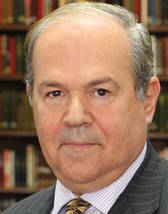Ukraine and the Consequences for Nuclear Deterrence
How significant is the danger that Russia may resort to nuclear weapons in the Ukraine war? And what do Russia’s indirect threats mean for the future of nuclear deterrence? Dr Matthew Harries (MH), RUSI’s newly appointed Director of Proliferation and Nuclear Policy, talks to Dr Jonathan Eyal (JE).
JE: Indirect but obvious threats from Russian politicians, suggesting that their country may be forced to use nuclear weapons if its territory – as defined by Moscow – is threatened, have multiplied in the past few weeks. Are you surprised by the emergence of these threats?
MH: No. Unfortunately, Putin’s war on Ukraine has had a nuclear element from the start; in unleashing the war, Putin made indirect nuclear threats. So, nuclear deterrence has been operating in the background of this conflict from the beginning, and it has to an extent been working on NATO. One of the reasons that the US and NATO allies don’t want a direct conflict with Russia – but not the only reason – is because at the end of the escalation ladder between Russia and the West is the possibility of the use of nuclear weapons.
Likewise, the nuclear threat has been operating for Russia as well: the leadership in Moscow know perfectly well that the US, the UK, France and NATO as an alliance are nuclear-armed. And they know that, just as we need to take Russian nuclear weapons seriously, Russia needs to take Western nuclear weapons seriously. So, the conflict has been limited in scope partly – but certainly not only – because of the presence of nuclear weapons on both sides. The corollary is that it is possible that the suffering and the punishment that Ukraine has had to absorb from this Russian aggression is more significant because of the existence of nuclear weapons and the existential fear of what an unrestrained war between the West and Russia would bring.
For those who have taken the nuclear aspect of this conflict seriously from the beginning, it was always relatively clear that the moment of maximum danger would come if and when Russia faced a large-scale defeat and there was a threat to Putin’s grip on power. We may not be at that moment of maximum danger yet, but we’re closer to it than we were at the beginning of the war. For that reason, it’s not surprising that Putin has grasped the nuclear hammer he has in his toolbox again.
Nuclear weapons are existential weapons and relate to the highest stakes a country feels it is risking. We may believe nuclear use is unlikely in the Ukraine war because of the grave consequences that could potentially follow. But those severe consequences start becoming more thinkable if you’re in an increasingly serious situation, as Putin is, with the war going badly for Moscow. However, Russia has for some time been willing to use what it sees as the power of nuclear risk and the fear of nuclear weapons as part of its strategy, part of its concept of strategic deterrence. Russia is more willing than Western countries to bring nuclear fear and nuclear risk into play in the conduct of strategy at various escalation levels, through rhetorical and military means, and to use what it sees as bargaining power through fear of nuclear use. The difficult task is to separate risk manipulation from the actual possibility of use.
JE: Given all this, was it correct for Western politicians to talk breezily about ‘defeating’ Russia in Ukraine? What does defeat mean for a nuclear power?
MH: If one looks at the Russian nuclear doctrine, which refers to a potential response to an attack that could threaten the existence of the Russian Federation, that is not dissimilar from Western nuclear doctrine as the core of what nuclear weapons are for. So, if you are talking about a defeat of Russia and the idea is that such a defeat could even lead to the fall of the governing regime, this is not exactly the same, but yes, you are potentially talking about circumstances in which nuclear weapons come into play in Putin’s mind. On the other hand, let us remember what this war is: we are talking about Ukraine resisting an invasion of its own territory; we’re not talking about supporting Ukraine to invade Russia. Western countries do not have the intention to invade Russia and topple the governing regime militarily. We’re talking about reversing an aggressive act by Russia.
The crunch comes if Vladimir Putin thinks a military reverse in Ukraine constitutes an existential threat. But even then, we have to think through whether there is a realistic scenario in which using nuclear weapons serves Putin’s purposes. And this is where I believe we are responsible for taking a balanced approach as analysts of this conflict. On the one hand, we need to take the nuclear risk seriously. On the other hand, we must remember that if one thinks through the scenarios for nuclear use by Russia, it is difficult to identify one that does not end badly for Russia and Putin.
The consequences of nuclear use start with risking diplomatic pariah status, even harsher sanctions, and even greater Western support for Ukraine, possibly including direct Western military intervention in the war. And at the very extreme end of the scale, there is the possibility of an escalation that leads to nuclear use against Russia. There are good reasons for Putin not to use nuclear weapons in Ukraine, no matter how badly the war is going for him and his military. However, it’s only reasonable to remind ourselves that early this year, many of us would have said that the war that Putin planned to launch on Ukraine was self-defeating, stupid, brutal and risking grave consequences for Russia. However, Putin still went ahead and committed all these errors.
Nuclear weapons are existential weapons and relate to the highest stakes a country feels it is risking
JE: Obviously, we’re all guessing, but is your instinct that we’ve seen the worst of the signalling on nuclear weapons from Russia? Or should we be prepared for worse to come?
MH: There may be worse to come, because there are further steps up the escalation ladder that Putin could be tempted to take. In rhetorical terms, he could get more specific about what he’s trying to deter and what he’ll do if that happens, which would present an even sharper dilemma for Ukraine and its Western backers. He could make visible, tangible changes to Russia’s nuclear posture or readiness by altering patterns of deployment of strategic nuclear forces or by putting non-strategic nuclear forces at a higher state of readiness. What Western leaders must do is prepare their publics for the possibility that if the desired course of action is to support Ukraine wholeheartedly and come what may, that could include having to deal with even more acute nuclear threats.
JE: Western intelligence services have been very good at tracking Russia’s conventional forces’ preparations for this war. Can we have the same confidence level about our ability to look at any nuclear escalatory moves by Putin?
MH: It’s a tricky question because Western detection capabilities are not publicly discussed in detail. Still, it would be unwise to base any Western strategy on the assumption that we’d definitely notice Russian nuclear preparations in time to prevent an attack. The focus needs to be on deterrence and explaining the scale of consequences that would follow for Russia if it were to use a nuclear weapon.
JE: But do we know what the consequences would be? After all, it’s a situation without precedent. There is no textbook example on which we can rely, is there?
MH: But, in a sense, that uncertainty is one thing that helps bolster deterrence. Would Putin want to lose the limited degree of control over this conflict that he currently has? Why would he want to risk the one thing that might be existential for Russia, which is direct Western military intervention in the conflict? This could potentially go in some very dangerous and destructive directions for Russia.
JE: The US is simultaneously engaged in strategic competition with China, and the Chinese are currently overhauling their nuclear arsenal. What messages – regarding nuclear brinkmanship – do we expect the Chinese to draw from the Ukrainian confrontation?
MH: If we look back over the past three decades, there’s been an effort to design a nuclear order through treaties, understandings and patterns of behaviour intended to manage a process in which the role of nuclear weapons would be minimised. Nuclear weapons were supposed to move gradually into the background of world affairs. The purpose of arms control and non-proliferation treaties was to manage that process and to make sure the complexities of it could be sorted out.
The assumption that this would happen in some areas of the world was always questionable: in South Asia, for example, the direction of travel was always in the opposite direction. Still, there was a chance to make nuclear weapons less relevant. But we have gone the other way. We are in a world where nuclear weapons are significantly increasing in importance. The lesson probably remains that nuclear weapons have a role in strategy that we hoped they wouldn’t have.
And when you combine that with the fact that China is emerging as a potential nuclear weapons peer to the US, we are moving into a potential trilateral, great power, nuclear competition between the US, Russia and China. It appears very unlikely that China will accept binding constraints on its arsenal in the next 5–10 years. Added to that, you have the possibility of a Chinese attack on Taiwan under the shadow of nuclear escalation.
We are moving towards the unhappy conclusion that the role that nuclear weapons play in this conflict appears to be the beginning of a new phase rather than the peak of a crisis. We should probably expect nuclear weapons and threats to play a role in other international crises in the future. Any crisis involving North Korea is an inherently nuclear crisis. Any crisis between India and Pakistan is an inherently nuclear crisis. And although the role of nuclear weapons in the tensions between the US and China is not totally at the forefront yet, that role is increasing.
We will have to put considerable thought into managing the risks of these types of crises and the dangers of a world in which nuclear weapons are a more significant part of strategy, because I think the risks are considerable. One element we are rediscovering is that deterrence requires risk to operate. Nuclear threats only really deter if they’re considered credible and carry some degree of risk. There is no automatic nuclear deterrence. We should prepare to live in a world where nuclear weapons are more important.
This interview was conducted before Russia’s latest round of missile attacks on Ukraine.
The views expressed in this Commentary are the author’s, and do not represent those of RUSI or any other institution.
Have an idea for a Commentary you’d like to write for us? Send a short pitch to commentaries@rusi.org and we’ll get back to you if it fits into our research interests. Full guidelines for contributors can be found here.
Jonathan Eyal
Associate Director, Strategic Research Partnerships
RUSI International
Dr Matthew Harries
Former Director of Proliferation and Nuclear Policy
- Jim McLeanMedia Relations Manager+44 (0)7917 373 069JimMc@rusi.org



